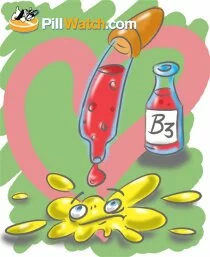
Nicotinic acid or Niacin was first discovered from the oxidation of nicotine to form nicotinic acid. Commonly known as Niacin (do not be confused with nicotine) it is derived from three words: NI – from nicotinic, AC – from acid, and IN – from vitamin. Other known name of the nicotinic acid is ‘Vitamin PP’ – this is a derivation from the term ‘pellagra-preventing factor’, as the mentioned disease pellagra is caused by the deficiency of niacin in the human diet.
Niacin (nicotinic acid or Vitamin B3) is a water-soluble vitamin whose derivatives play essential roles in energy metabolism in the living cell and repairing of DNA cells.
This vitamin occurs naturally and can be used to treat high cholesterol problem. There are several ways in treating high levels of ‘bad’ cholesterol:
1. In natural way – with the help of a good diet (food, that is low in cholesterol or doesn’t contain it at all)
· Statins (group of drugs used as pharmaceutical agents to lower LDL (‘bad’) cholesterol levels)
· Nicotinic acid or niacin
· Fibrates (hypolipidemic agents primarily used for decreasing triglycerides and increasing HDL (‘good’) cholesterol)
· Bile acid resins (hypolipidemic agents that may be used for lowering cholesterol purposes)
When good food habits, physical activity and good lifestyle changes (as give up smoking and reducing alcohol consumption) do not help to lower your cholesterol (for at least 6 months of trying) nicotinic acid is an effective tool in treating high cholesterol.
High levels of LDL cholesterol, triglycerides and other fats in the bloodstream is dangerous for human’s body as all these increase the risk of hardening of the arteries (disease called atherosclerosis), heart attack, other heart-related conditions and stroke. The risk is too high when one has already suffered from heart attack. Having your total cholesterol in the norm is very important for a long healthy life.
Niacin is found available in medicines such as Slo-Niacin or Niaspan and also in natural sources - in meat, eggs, poultry, liver, fish, green vegetables, nuts, whole grains and potatoes.
Niacin is one of the main form of vitamin B3, another one is nicotinamide (niacinamide).
When taken is low doses niacin is very good for nutritional purposes, high doses are necessary for the treating of high cholesterol. Nicotinamide does not lower cholesterol levels and should not be used in place of nicotinic acid. Niacin is available without a prescription. Or can be sometimes prescribed in addition to other cholesterol-reducing medications. As with any medications one should consult a physician before taking niacin and while taking it - should be closely monitored by their physician.
· It reduces the production of triglycerides.
· It reduces very low-density lipoprotein, which is converted into low-density lipoprotein and as a result reduces this LDL (‘bad’) cholesterol level in the blood.
· It increases HDL (‘good’) cholesterol level in the blood.
There is certain group of people that shouldn’t take niacin for lowering-cholesterol purposes: these are people with active stomach ulcer, glaucoma, gout, clotting disorders (hemophilia and others), with active liver disease, alcoholism and with oversensitivity to niacin.
Niacin is really effective. It reduces triglycerides by 20-50%, also reduces LDL by10-25%. Along with that it increases HLD cholesterol level in the blood by 15% to 35% which also increases the additional chances to lower more of LDL.
- Liver inflammation (if vitamin B3 is taken in high doses). Watch out the symptoms - yellowing of the eyes and/or skin – and regularly do your blood testing and enzyme tests. It is especially with the sustained-release form.
- Dizziness or lightheadedness: to avoid this stand up slowly after lying position.
- Flushing (redness or warmth of the face) which is more common with the immediate-release forms of nicotinic acid
- Itching
- Headaches (migraines)
- Night sweats
- Palpitations, cardiac fibrillations, or other arrhythmias
- Gastrointestinal problems such as upset stomach, gas, nausea, vomiting, and diarrhea
- High blood sugar (hyperglycemia).
Some of the side effects will pass in some time, for some of them there are other medications to ease the condition.
There are two types of nicotinic acid:
1. Immediate release. The price is comparatively inexpensive, you can buy it without prescription, but because of the potential side effects it should be used only with doctor’s monitoring.

2. Extended-release is considered to be better tolerated and the dose necessary for the result is very small. Though it also causes some side effects (such as liver damage).
Of course as any medication it should be taken regularly and properly. You can not miss a dose and you can not take double doses of this medication. Follow the directions of your physician carefully and seriously. Also do not stop taking it without first consulting of your physicians.
If you’ve decided to take niacin in order to lower your cholesterol do it only after consulting your doctor and with constant monitoring. In any way, the dose should be increased gradually in order to minimize side effects until the effective cholesterol-lowering dose is reached. And even then do not forget to help your body overcome the problem: live a healthy life with healthy habits.
Valentyna Ant.
| Tip for you : Sign-in with Your OpenID and post faster, easier and with easy access to all your past posts. | |
|
Your Nick: |
















